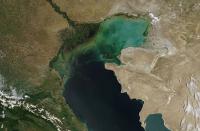-
Combining high performance computing, public policy analysis for better water resource management
With growing demand and a changing climate, the Colorado River Basin is under significant stress. The river supplies water to thirty million people in seven states, supports billions of dollars in economic activity each year, and irrigates 15 percent of all U.S. crops. It also provides water to twenty-two Native American tribes, four national recreation areas, and eleven national parks. Researchers have joined forces to combine high-performance computing with innovative public policy analysis to improve planning for particularly complex issues such as such as water resource management.
-
-
The lesson from the demise of the Maya civilization: Water shortage can destroy cultures
Within a short period of time, the advanced Maya civilization in Central America went from flourishing to collapsing — the population dwindling rapidly and monumental stone structures, like the ones built at Yucatán, were no longer being constructed. Mathematical models analyzing the interplay between society and hydrological effects have found the explanation: the irrigation technology that served the Mayans well during periods of drought may have actually made their society more vulnerable to major catastrophes. These models provide insights into ancient cultures – as well as into our own future.
-
-
NSF announces $55 million toward national research priorities
The National Science Foundation (NSF) has made eleven awards totaling $55 million aimed at building research capacity to address fundamental questions about the brain and develop new innovations at the intersection of food, energy, and water systems. These four-year awards support twenty-seven institutions in eighteen eligible jurisdictions.
-
-
How a new source of water is helping reduce conflict in the Middle East
Just a few years ago, in the depths of its worst drought in at least 900 years, Israel was running out of water. Now it has a surplus. This remarkable turnaround was helped by increasing conservation and re-use – but the biggest impact came from a new wave of desalination plants. Israel now gets 55 percent of its domestic water from desalination. Moreover, scientists and others look to desalination as a way to unite longtime enemies in a common cause.
-
-
Six million Americans drink water with unsafe levels of toxic chemicals
Levels of a widely used class of industrial chemicals linked with cancer and other health problems exceed federally recommended safety levels in public drinking water supplies for six million people in the United States, according to a new study.
-
-
Brazil’s sewage woes reflect the growing global water quality crisis

All eyes are turned toward Rio de Janeiro to watch top athletes compete, yet the headlines continue to highlight the problems with the water quality and the risks to the athletes who swim, row, and sail, and even to tourists simply visiting the beaches. But Brazil’s wastewater woes are hardly unique. The water quality of lakes, rivers, and coastal shorelines around the world is degrading at an alarming rate. In fact, pollution of the ten largest rivers on earth is so significant that it affects five billion people. While the spotlight is shining on the athletes over the next few weeks, let us also shine a spotlight on what we can do to improve and restore water quality around the world through our collective efforts, use of new tools, and risk frameworks, moving the political will one step closer toward sewage treatment and protection of the biohealth of the blue planet.
-
-
Trading farmland to protect water from nitrogen

Excess nitrogen from agricultural runoff can enter surface waters with devastating effects. Algal blooms and fish kills are a just a couple of possible consequences. But riparian buffer zones – areas of grasses, perennials, or trees – between farmlands and streams or rivers can help. But what kind of vegetation makes buffer zones most efficient at removing nitrogen from runoff? A new study sets out to answer.
-
-
Earthquake-resilient pipeline could allow Los Angeles’s water utility system withstand tremors

Los Angeles’s water utility system – the nation’s largest — crosses over thirty fault lines en route to supplying water to more than four million residents. A top engineer from the city of Los Angeles visited Cornell University this month as researchers tested a new earthquake-resilient pipeline designed better to protect southern California’s water utility network from natural disasters. The steel pipe uses a unique structural wave design to control buckling, allowing the pipe to bend and compress without rupturing or losing water pressure.
-
-
Cities face dramatic increase in water treatment spending when watersheds are damaged
A new global study has found that one in three large cities spend 50 percent more on water treatment costs as a result of damage to the ecological quality of their watersheds. This study found that urban source watershed degradation is widespread globally, with 9 in 10 cities losing significant amounts of natural land cover to agriculture and development in the watersheds that supply their drinking water. This has led to polluted water and an increase in water treatment costs that represent a liability in excess of $100 billion.
-
-
Cape Cod susceptible to potential effects of sea-level rise
Cape Cod is vulnerable to rising water tables and, in some areas, groundwater inundation as a result of rising sea levels, according to a new U.S. Geological Survey study (USGS). Groundwater inundation occurs when the water table reaches or exceeds land surface. The challenges associated with the issue are likely to become more prevalent as seas rise. Depending on the severity, it may make areas unsuitable for residential and commercial development.
-
-
Managing the endangered Rio Grande River across the U.S.-Mexico border

The Rio Grande (called Rio Bravo in Mexico) is the lifeline to an expansive desert in the southwest United States and northern Mexico. From Colorado to the Gulf of Mexico, over 3,000 km, people depend on the river to quench their thirst and irrigate their crops. Yet as the river flows from the United States, it brings with it conflicts and challenges. The water level in the river is declining as use exceeds supply. Water demand is rising as the population in the region grows, and corresponding economic growth drives continued development. Moreover, climate change is expected to lower water levels even further, exacerbating the problems.
-
-
Modeling program helps efficient water management
For as long as civilization has existed, river basins have been the lifeblood of human settlement. And who is to say that ancient Babylon might not have benefited from a watershed management plan? Today there are many more people who rely upon water to a much greater degree, which is why a team of researchers has developed a modeling platform called Water and Energy Scenarios Testing — WEST — for integrated resource planning.
-
-
California droughts caused mostly by changes in wind, not moisture

Droughts in California are mainly controlled by wind, not by the amount of evaporated moisture in the air, new research has found. Their analysis showed that although moisture evaporated from the Pacific Ocean is the major source for California precipitation, the amount of water evaporated did not strongly influence precipitation in California, except in the cases of very heavy flooding. The research increases the understanding of how the water cycle is related to extreme events and could eventually help in predicting droughts and floods.
-
-
“Water windfall” beneath California’s Central Valley
New research indicates that California’s Central Valley harbors three times more groundwater than previously estimated, but challenges to using it include pumping costs — much of the water is 1,000 to 3,000 feet underground — ground subsidence, and possible contamination from fracking and other oil and gas activities.
-
-
Holocaust survivors give historic $400 million gift to Ben-Gurion University
A couple who survived the Holocaust and made a fortune investing with Warren Buffett left a $400 million bequest to Ben-Gurion University (BGU). The bequest, much of which is earmarked to fund water-related research, is expected to double the size of BGU’s current endowment. The university’s Zuckerberg Institute for Water Research focuses on sustainability of water resources, desalination techniques, and improving water quality.
-
- All
- Regional
- Water
- Biometrics
- Borders/Immig
- Business
- Cybersecurity
- Detection
- Disasters
- Government
- Infrastructure
- International
- Public health
- Public Safety
- Communication interoperabillity
- Emergency services
- Emergency medical services
- Fire
- First response
- IEDs
- Law Enforcement
- Law Enforcement Technology
- Military technology
- Nonlethal weapons
- Nuclear weapons
- Personal protection equipment
- Police
- Notification /alert systems
- Situational awareness
- Weapons systems
- Sci-Tech
- Sector Reports
- Surveillance
- Transportation
Advertising & Marketing: advertise@newswirepubs.com
Editorial: editor@newswirepubs.com
General: info@newswirepubs.com
2010-2011 © News Wire Publications, LLC News Wire Publications, LLC
220 Old Country Road | Suite 200 | Mineola | New York | 11501
Permissions and Policies
Editorial: editor@newswirepubs.com
General: info@newswirepubs.com
2010-2011 © News Wire Publications, LLC News Wire Publications, LLC
220 Old Country Road | Suite 200 | Mineola | New York | 11501
Permissions and Policies
